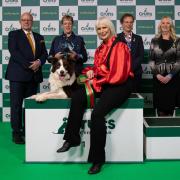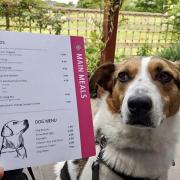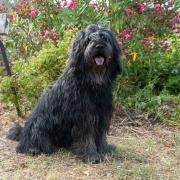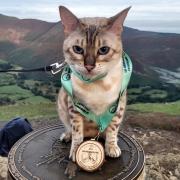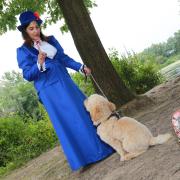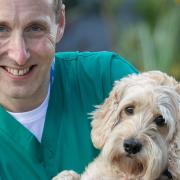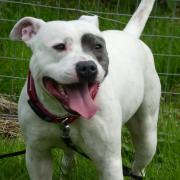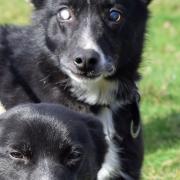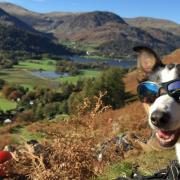Emily Rothery meets three women helping dog owners keep their pets in line and protect livestock.

When Sandra Swainson’s border collie, Bob, had a few behaviour issues she decided to take him to a dog training class. Bob’s problems were resolved but Sandra stayed in contact with the trainer, Janet Fox, who runs classes at Winster near Windermere. Twelve years on Sandra and Janet have become firm friends, bonding initially over their love of dogs, they now meet regularly, with another colleague and good friend, Kendal dog trainer, Sue Whiteley.
The three friends get together to discuss dog behaviour and training or upcoming talks and workshops. There is laughter as they describe themselves as ‘dog geeks’ but it’s clear that they take their roles very seriously. ‘Training dogs and advising their owners is a huge responsibility so it’s nice to be able to discuss ideas with like-minded people and bounce ideas off each other,’ says Janet.
Janet and Sue are members of the Association of Pet Dog Trainers and Sandra, who studied animal care and currently home-boards dogs, now helps Janet with her classes. As APDT members, their training is regularly reviewed and based on up-to-date, researched methods.
Meetings often take place in Sandra’s Lake District farmhouse at the head of the Duddon valley, situated on the junction between the notorious Hardknott and Wrynose passes and flanked by Grey Friar Fell. Sandra has lived at Cockley Beck Farm, with partner Kevin Wrathhall, for 13 years and knows that, although wild and remote, this iconic valley draws many visitors. Over the years Sandra, who has two young daughters, has tolerated people knocking at her door requesting the use of her telephone, toilet, petrol and even the tyres of her car. ‘There’s barely a day goes by without someone calling, but the thing that bothers us above all else is people who don’t control their dogs.’

Kevin farms a flock of around 400 Herdwick sheep and a small herd of shorthorn cattle so it is no surprise that sheep worrying is often on the agenda.
We gather around Sandra’s large farmhouse kitchen table as she recounts a time – just one of many – when an irresponsible dog owner opened the boot of his car and gave free reign to his two dogs. ‘The dogs singled out one Herdwick, she was mauled and ran to the river. We will never know if she died of her injuries or drowned and the dog owner just drove off and left. Fortunately, a local had taken the owner’s car number and reported it to the police so the case was followed up but to us it was still very distressing.’
As practice manager for Oakhill Veterinary Group in Windermere, Janet has also heard heart-breaking tales of the damage that dogs can do to sheep and lambs and financial loss to farmers. ‘I’ve known of eight lambs killed in one attack and it’s so unnecessary,’ she said.
There is an increasing number of livestock worrying caused by dogs in the Lake District and neighbouring Lancashire thus educating owners to be in control of their pets around livestock is an essential part of training for these three dedicated women.

‘Many people are unaware of the harm that a dog can cause sheep. Often dogs don’t want to attack sheep but just want to chase and in doing so can cause harm and distress. Pregnant ewes may miscarry their lambs and sheep may be injured as they panic and run into fences, or drown as they run into becks,’ says Sue who is now self- employed but worked as a veterinary nurse at the Kendal’s Highgate practice until two years ago.
Aversive methods, such as electric collars which are designed to give a dog a shock for unwanted behaviour, are decidedly frowned upon. ‘These cause the dog pain and are just quick fix attempts to stop chasing, which can create more problems. If you want to let your dog run off the lead in the countryside away from livestock then there are a range of techniques that can be used to improve recall,’ says Sue who runs classes at Kendal and Crooklands, including a popular summer course on recall and chase.
Janet adds: ‘We are committed to raising the standards in dog training and behaviour and use reward based positive training. Classes set you on the right track but training for your dog should be life-long and enjoyable. Using distractions such as toys and treats takes your dog’s focus away from other things or you can channel the searching drive through hiding toys or food in different places. It’s all about building a bond and trust with your dog so that walks are enjoyable for both of you but you have to be prepared to put in a lot of time and commitment.’
Sandra can happily let her two black labradors, Harry and Zak, walk without leads on the land at Cockley Beck but wouldn’t dream of letting them loose elsewhere. ‘It’s just basic manners. I don’t think my dogs are exempt; even though I trust them around home they might react completely differently in another situation.’
Janet’s golden retrievers, Clover and Crystal join us as we walk through the fields beneath the fells where sheep and lambs contentedly graze in nearby fields. Harry and Zak, Clover and Cyrstal are calm and happy around livestock yet remain firmly on their leads.
‘We all agree that it’s our job to educate ordinary pet owners and help them to train their dogs to be well behaved, happy, sociable and a pleasure to live with,’ says Janet. ‘We are our dogs’ guardians after all and it’s up to us to keep them safe, happy and out of trouble.’ w
For further information, go to Sue Whiteley’s website at goodstartdogs.co.uk or Janet Fox’s Facebook page, Weetwood Dog Training.




